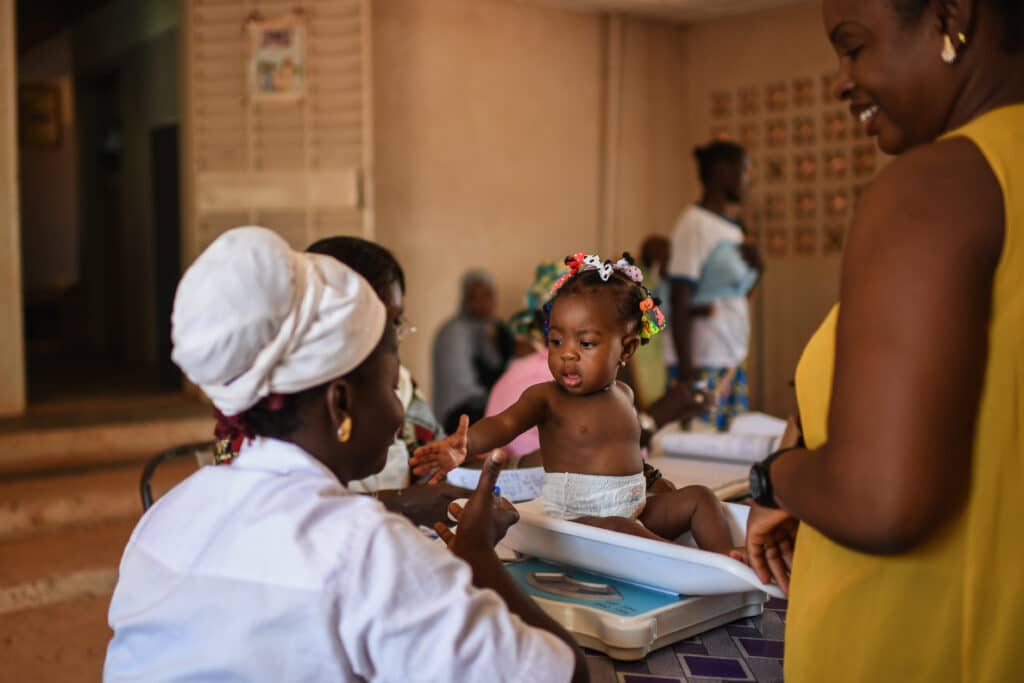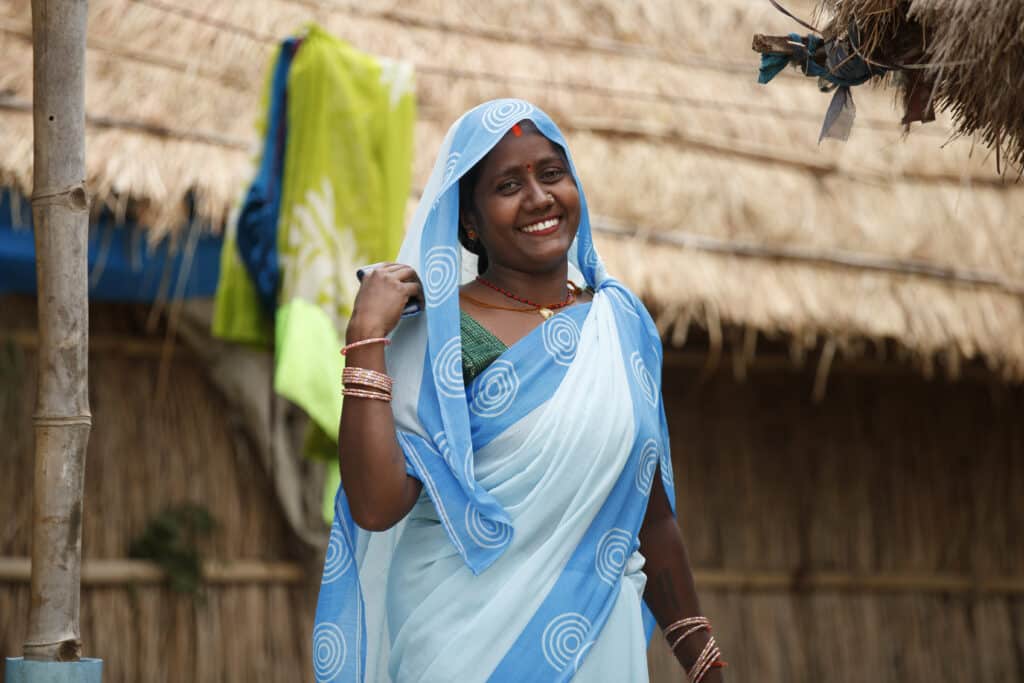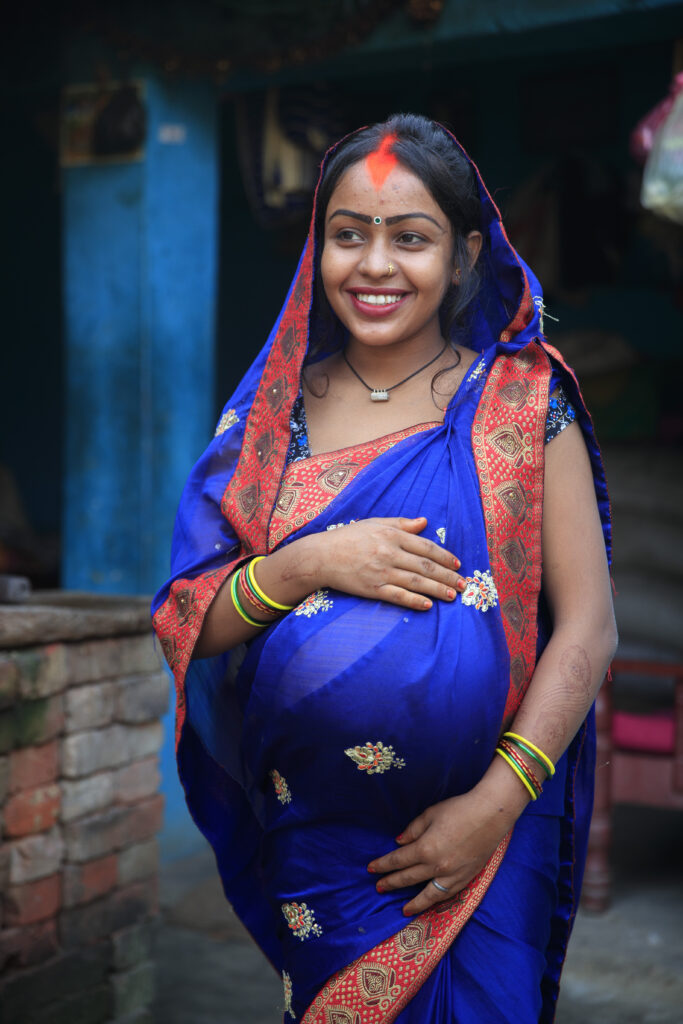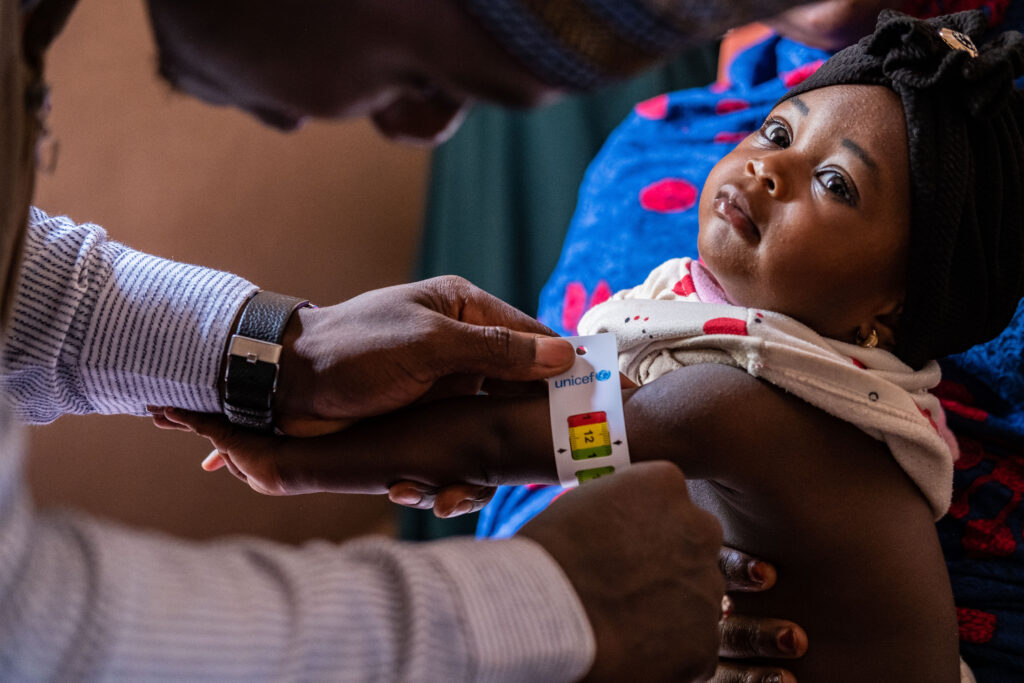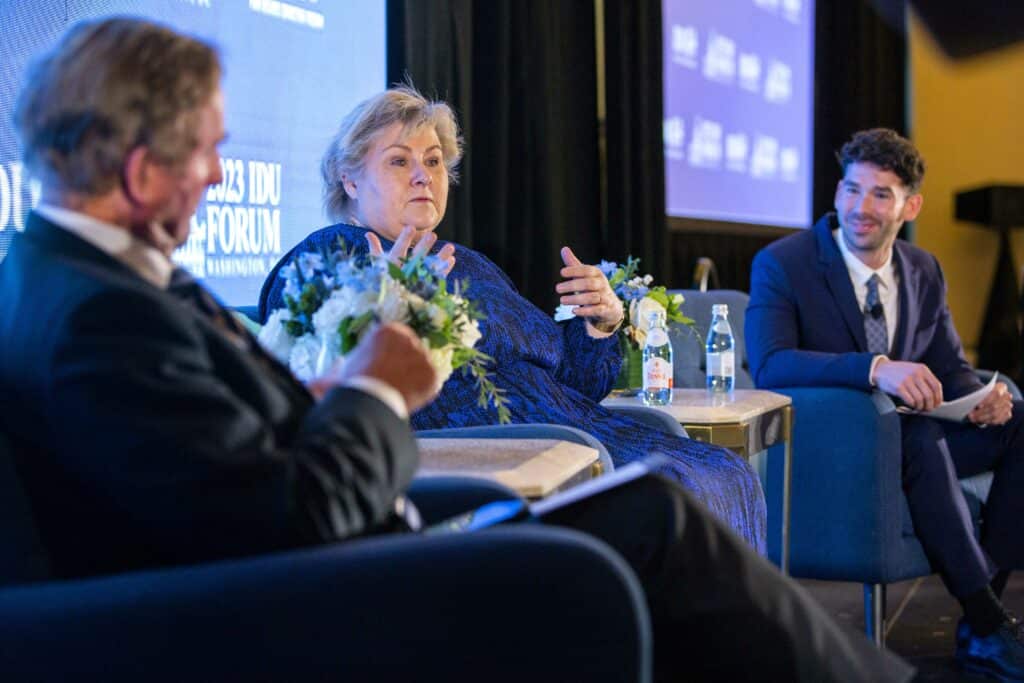At the Global Vaccine Impact Conference held June 13-15 in Madrid, Spain, the Eleanor Crook Foundation and Gavi, the Vaccine Alliance announced the NutriVax Project, a joint investment of $2 million that will fund research to explore the impact of pairing a high-impact malnutrition intervention with immunization services. This investment holds promise to improve health outcomes for vulnerable children on two critical fronts: nutrition and immunization.
What Problem Do We Face?
Malnutrition and infectious disease are mutually reinforcing—and together cause millions of preventable child deaths each year. Malnutrition weakens the body’s immunity and is associated with higher prevalence and severity of infectious diseases, and malnourished children are significantly more likely to die from diseases like pneumonia, diarrhea, measles, meningitis, and tuberculosis. Additionally, some scientists have suggested that malnourished children may not get maximum protection from vaccines, because of their compromised immune response. And finally, infectious diseases deplete the body of resources, which can in turn cause malnutrition. A dangerous cycle therefore exists between malnutrition and infectious disease that markedly increases the risk of child mortality.
Tools to tackle malnutrition and prevent infectious disease are proven and cost-effective – and often cited as “best buys” in global development. And yet coverage for these interventions remains far below what is needed. Furthermore, many of the children who are at high risk of malnutrition are the same children who are missing out on critical immunization services. And while in some communities vaccine supply or a lack of health services causes low immunization rates, in others the greatest challenge is demand for vaccines.
Through the NutriVax Project, ECF and Gavi aspire to achieve more together than what is possible alone, reaching a vulnerable cohort of children in great need of both nutritional support and vaccines.
What Will this Funding Do?
The NutriVax Project will fund a randomized control trial in Nigeria to test whether providing nutritional supplements as an incentive for vaccination can help solve the challenge of generating demand for vaccination. The study will take place in communities that face a double burden of low coverage of routine childhood immunizations and a high burden of wasting. Specifically, the project will use a randomized control trial to test whether providing Small-Quantity Lipid-Based Nutrient Supplements (SQ-LNS) as an incentive to caregivers for updating their children’s vaccinations will lead to increased coverage of the measles vaccine. Secondary indicators will look at coverage of other vaccines and nutrition-related outcomes.
SQ-LNS are food-based supplements designed for the prevention of malnutrition in children 6-24 months of age. SQ-LNS for infants and young children contain the daily recommended intake of necessary micronutrients and can be mixed with foods prepared in the home or consumed as is, allowing for flexibility in feeding practices. A recent analysis confirmed that feeding a child four teaspoons of SQ-LNS for at least 6 months can reduce their risk of mortality by 27%. In addition, these supplements are shown to decrease anemia, as well as cases of severe wasting and severe stunting. They’ve also proven to reduce developmental delays. [1],[2],[3],[4]
Why Are We Funding This Research?
The research from the NutriVax Project offers great promise on multiple fronts for global health. ECF and Gavi are excited about this combined effort, which could not only improve nutrition, but also incentivize vaccination, potentially leading to a significant reduction in childhood mortality.
“Given the serious disruptions caused by the pandemic, this is the time to invest better and smarter, as countries gradually find ways to restore and strengthen immunization, nutrition and other essential services,” said Guillaume Grosso, Director of Sovereign & Private Sector Engagement, Donor Relations & Campaigns at Gavi.
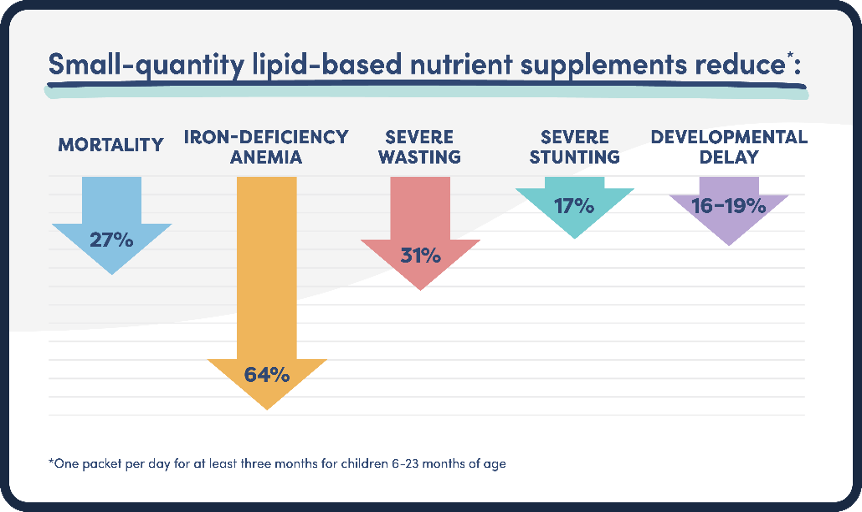
“We are proud to partner with ECF to generate evidence around cost-effective ways to drive the big catch-up in immunization via nutritional services in Nigeria.”
ECF and Gavi have worked closely for several months to conduct a review of bundling immunization and nutrition programming, which identified that this integration is a promising strategy in need of more research. The review will be released in July 2023.
Other background research includes a randomized control trial in India, which found that “offering modest incentives to families in resource poor settings can significantly increase uptake of immunization services.”[5] Operational experience from ALIMA in Niger suggest that mass supplementation with LNS products likely had an impact on high vaccination coverage seen in the participating health zones. Further, a modeling simulation published in the The American Journal of Tropical Medicine and Hygiene found that increasing vaccine coverage through mass nutritional supplementation with SQ-LNS would lead to a strong reduction in morbidity and mortality, especially from measles.[6]
While this approach is promising, more rigorous research is needed to inform future scaleup. We expect to find an incentive effect, but it is possible that the barriers families face for attending vaccination are too large to overcome even with added motivation, or that they do not value the SQ-LNS as much as we expect based on field experience. Conversely, it is possible that the incentive works, but that SQ-LNS is not used by families as intended (consumed daily by a child aged 6-24 months), in which case the expected nutritional impact would be limited. We expect that this integrated program will contribute to both immunization and nutrition efforts, but this impact hasn’t been rigorously proven to date – which is why more research will enable us to assess the size of the impact relative to the cost, a critical first step for policymakers and stakeholders.
What Would Success Look Like?
High rates of wasting and low vaccination coverage is a debilitating double burden threatening the health of millions of children around the world in fragile health systems. NutriVax may offer one solution to the devastating problem of preventable child deaths.
In the short term, success for the NutriVax approach in this research will mean:
- substantially improved measles vaccination rates (10%-30% higher);
- evidence that the SQ-LNS is being used broadly as intended by families, which is already proven to have strong impacts on nutrition; and
- a deeper understanding of the feasibility of this approach.
In the longer term, a strong result from this trial will prove that NutriVax is a cost-effective approach to improving primary healthcare, and worthy of scale up. And an increase in the project’s scale could galvanize interest in joint programming that integrates compatible interventions into national health systems. Ultimate success will mean more children have access to health and nutrition services, exponentially increasing the number of lives saved and allowing more children to live healthy and productive lives.
[1] Keats EC, JK Das, RA Salam, ZS Lassi, A Imdad, RE Black and ZA Bhutta (2021). “Effective interventions to address maternal and child malnutrition: an update of the evidence.” Lancet Child Adolesc Health 5(5): 367-384.
[2] Dewey, KG, CP Stewart, KR Wessells, EL Prado and CD Arnold (2021). Small-quantity lipid-based nutrient supplements for the prevention of child malnutrition and promotion of healthy development: overview of individual participant data meta-analysis and programmatic implications. Am J Clin Nutr 114(Suppl 1): 3S-14S.
[3] Stewart, CP, KR Wessells, CD Arnold, L Huybregts, P Ashorn, E Becquey, JH Humphrey and KG Dewey (2020). Lipid-based nutrient supplements and all-cause mortality in children 6-24 months of age: a meta-analysis of randomized controlled trials. Am J Clin Nutr 111(1): 207-218.
[4] Prado EL, CD Arnold, KR Wessells, CP Stewart, et al (2021). Small-quantity lipid-based nutrient supplements for children age 6-24 months: a systematic review and individual participant data meta-analysis of effects on developmental outcomes and effect modifiers. Am J Clin Nutr 114(Suppl 1): 43S-67S.
[5] Banerjee AV, Duflo E, Glennerster R, Kothari. Improving immunisation coverage in rural India: clustered randomised controlled evaluation of immunisation campaigns with and without incentives. BMJ. 2010;340:c2220. Published 2010 May 17.
[6] Noori N, Skrip LA, Oron AP, McCarthy KA, Proctor JL, Chabot-Couture G, Althouse BM, Phelan KPQ, Trehan I. Potential Impacts of Mass Nutritional Supplementation on Measles Dynamics: A Simulation Study. Am J Trop Med Hyg. 2022 Sep 12;107(4):863-872. doi: 10.4269/ajtmh.21-1083. PMID: 36096407.
Photo Credit: UNICEF/UN0701229/N’Daou
Chart credit: Helen Keler International
